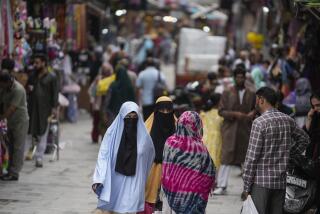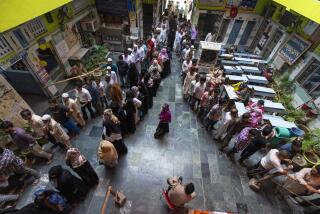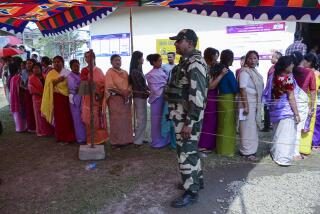Vote Disputed Even as Kashmiris Go to Polls
- Share via
SOPUR, India — In the alpine vales and mountains of bloodied Kashmir, voters went to the polls Saturday to choose their government for the first time in nearly a decade, an act that Indian officials hailed as a triumph of democracy and a vital step on the road to peace.
Instead, many Kashmiris said they trooped to the ballot box only under threats and pressure from the Indian army and security forces. Militants who dream of independence for the former Himalayan principality called the voting a meaningless farce. The Kashmiri rebels have rejected any election that does not include the option of seceding from India.
“When the new government is formed, the orders will still come from New Delhi. The implementing hand will be Kashmiri, but the brain will be Indian,” charged Umar Farooq, chairman of the All-Party Hurriyat Conference, an umbrella group of Kashmiri separatist organizations.
In the rice-growing village of Choora, one of the first locales to choose a state legislator in a staggered process that will last a month, some of the 800 inhabitants said troops came during early morning Muslim prayers and ordered them over the mosque’s public address system to vote.
“ ‘Come out,’ the soldiers told us, ‘or you will be in great trouble,’ ” farmer Abdul Rashid said.
In Putkha, another hamlet, residents said soldiers went door to door and threatened to return and beat up anyone whose hands weren’t marked with the ink dabbed on voters’ fingers when they cast ballots.
Three boys were killed in election-related violence in Jammu and Kashmir state, Associated Press reported.
The election process to revive the legislative assembly in the state, the only Muslim-majority state in primarily Hindu India, is key in the Indian government’s strategy to suppress a separatist revolt, as well as to heal the painful rifts provoked by its brutal counterinsurgency campaign and the direct rule imposed from New Delhi in January 1990.
Faced with widespread international condemnation of its human rights practices in Kashmir, India is also very eager to prove to the world that the bulk of the population is on its side.
J.A. Khan, the state election commissioner, said preliminary figures showed the total turnout in the 26 districts that cast ballots at between 50% and 53%. But in some cases, the official figures appeared suspect.
Khan reported a 45% turnout in the town of Baramula, but as of noon, only 23 of the 1,882 voters in two of the town’s precincts had cast ballots, poll workers there said.
Although Indian officials made light of the impact of the separatists’ call for an election boycott, police arrested 29 people, the government said.
Two Hurriyat leaders, Yasin Malik and Javed Ahmed Mir, said that when they arrived in Baramula on Friday to plead with people to stay away from the polls, they were clubbed by soldiers, bundled into a taxi and sent to a hospital in Srinagar, the state summer capital.
Although journalists heard numerous complaints from residents about coercion by soldiers and police, Indian officials denied pressure had been applied to ensure a respectable turnout.
“The security forces did not tell people, ‘You shall go and vote,’ ” said Ramamohan Rao, India’s information advisor to the Kashmir government.
In some Muslim areas such as Gulmarg, turnout appeared heavy and wholly voluntary. Weary of the fighting that by common counts has left 50,000 dead and destroyed the economy and the tourism industry, ordinary people endorsed the return of a popularly chosen government as a protection of their lives and interests.
“People are willingly going to give their vote, because they want an end to this terrorism,” said A. G. Wani, who came to a school in Sopur to cast his ballot.
The last election to Kashmir’s 87-seat assembly was in 1987. Its new composition is expected to sharply reflect Kashmir’s religious and ethnic divides. In the Muslim Kashmir Valley, the National Conference--the dominant party in the state--should be the winner. The Hindu nationalist Bharatiya Janata Party should capture the mostly Hindu Jammu region, and the Congress (I) Party the Buddhist enclave of Ladakh.
*
Prime Minister H. D. Deve Gowda has promised “maximum autonomy” for the state, but unraveling the Kashmiri knot--a quandary that has bedeviled India since independence in 1947--may prove as difficult for the new prime minister as for his predecessors.
Armed militancy is now on the wane, but Indian officials say that Pakistan, which lays rival claims to Kashmir and administers about a third of the old princely state, is still training and equipping fighters and infiltrating the border.
More to Read
Sign up for Essential California
The most important California stories and recommendations in your inbox every morning.
You may occasionally receive promotional content from the Los Angeles Times.













